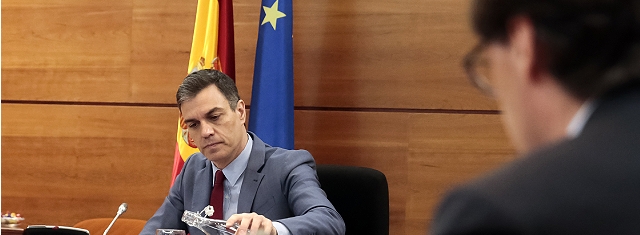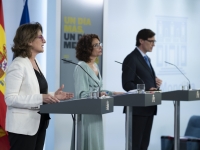Politics
Spanish Government will ask Parliament to extend the state of alarm until June 7
Last extension, if everything goes well

Pedro Sánchez (Source: Pool Moncloa)
USPA NEWS -
The Spanish Government agreed on Tuesday to request the Congress of Deputies for a new extension of the state of alarm until June 7 at zero hours. The Minister of Finance and government spokesperson, María Jesús Montero, appealed to parliamentary forces to support this Wednesday the petition that President Pedro Sánchez will convey to them. Montero affirmed that the state of alarm is the only legal instrument that allows restricting the mobility of the population, a key factor to "fight the pandemic and save lives."
In the same sense, the Health Minister, Salvador Illa, pronounced: "The state of alarm is essential until the end of the escalation process, which will continue to be guided by prudence, caution and security; each step we take will be a safe step," he said. Illa explained that the approved text consolidates the principles of co-government with which the de-escalation is being conducted and reduces the competent delegated authorities to the Ministry of Health, under the highest leadership of the Prime Minister. Likewise, the procedural and prescription terms and the expiration of rights and actions will count again from June 4. Also from June 1, administrative deadlines will count again.
Mandatory use of masks
The Minister of Health confirmed that the use of the mask will be mandatory, in addition to public transport as until now, in closed spaces and on public roads provided that the two-meter interpersonal safety distance cannot be maintained. This was decided by the Technical Committee for de-escalation after a meeting with the regions. The measure will take effect when the corresponding order is published in the Official State Gazette.
Salvador Illa reviewed the latest data on infections, which he described as "good", since they reveal an increase percentage that does not exceed 0.5% daily, in line with the objectives set. Even so, he reiterated that it is necessary to continue acting with maximum individual responsibility and complying with the instructions and recommendations of the health authorities.
Climate change and energy transition
The Spanish Government also approved at its meeting on Tuesday the referral to Parliament of the draft Law on Climate Change and Energy Transition in order to achieve emissions neutrality by 2050. María Jesús Montero stressed that, in the opinion of the Government, the energy transition or the fight against the climate emergency are two axes on which the reconstruction of the country will pivot. In addition, he celebrated that this matter has been reflected in the work plan of the Commission for social and economic reconstruction after COVID-19, which has been established in the Congress of Deputies.
In the same sense, the fourth vice-president and minister for the Ecological Transition and the Demographic Challenge, Teresa Ribera, defended that "we cannot go back to the previous model" but that we must promote a model of sustainable and inclusive development that takes into account the disadvantaged, avoid increasing inequalities, "generate decent employment," modernize the economy and industry, enable people to live in healthier cities, recognize the value of rural development and protect biodiversity.
The vice president explained that the text, complying with the Paris Agreement and consistent with scientific criteria and the demands of citizens, determines that Spain must achieve emissions neutrality before 2050, and that the electricity system will also have to be one hundred percent renewable before that date. Teresa Ribera pointed out that the bill establishes that, in 2030, Spain will have to have reduced its greenhouse gas emissions by 20% compared to 1990, "which in practice means removing one out of every three tons that we currently issue," as stated in the National Integrated Energy and Climate Plan.
The text states that 35% of final energy consumption, including all sources, must be of renewable origin and 70% of the energy generated by the country must come from renewable sources. "With this objective, the deployment of clean energies is activated, which are already the cheapest, simplest, most productive source of energy and the one with the most interesting industrial value chain for our country," said the vice president.
The Spanish Government's objective is to reduce primary energy consumption by at least 35% thanks to energy efficiency measures, which will be especially important in the building sector. Furthermore, the standard lays the foundation for sustainable mobility and establishes a framework for the world of finance to move towards sustainable investments. It is about, said Ribera, "not to waste a euro and that each of the public or private investment decisions go in the right direction, mobilizing change and preventing money from ending up in the trash."
The project also introduces reporting obligations for climate change risk in regulated markets, credit institutions, insurance companies, in the financial and energy system. It promotes the inclusion of environmental education in the curricula and is committed to training in jobs of the future linked to a low-carbon economy.
Liability for this article lies with the author, who also holds the copyright. Editorial content from USPA may be quoted on other websites as long as the quote comprises no more than 5% of the entire text, is marked as such and the source is named (via hyperlink).






